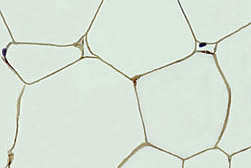|
Read the
magazine
story to find out more. |
|

Fat tissue from a
mouse. The brown borders of the cells are perilipin protein. The protein
controls the release—or not—of fat for energy. Click the image for
more information about it.
|
Genetic Variants Shown to Hoard Body Fat
By Rosalie Marion
Bliss March 20, 2006
Two variations of a gene associated with obesity and type 2 diabetes
have been linked to storing excess fat--and therefore influencing body
weight--in Caucasian women.
Agricultural Research Service (ARS)-funded scientists looked at four
variations of the gene that produces perilipin protein. This protein plays an
extremely significant role in determining whether fat is stored within fat
cells or released for use as energy. The more perilipin protein produced, the
more fat is stored.
Physician
Andrew
Greenberg and nutrigenomics expert
Jose
Ordovas at the
Jean
Mayer USDA Human Nutrition Research Center on Aging at
Tufts University in Boston, Mass., have
been studying the perilipin gene variants 13041A/G, 14995A/T, 6209T/C and
11482G/A.
Ordovas determined which of these four variants was carried by 373
male and 361 female study participants. He then compared the holders of the
different variants to measurements of their body fat percentage and waist
circumference.
Women with variants 13041A/G and 14995A/T tended to have a higher
percentage of body fat and greater waist circumference than women with the
other two variants. The same pattern was not found in men, likely because of
hormonal differences. According to Ordovas, the 13041A/G and 14995A/T inherited
variations are a significant genetic marker of obesity in women. The study was
published in Obesity
Research.
The study is part of a
special issue on ARS
obesity research in the March 2006 issue of Agricultural Research
magazine.
ARS is the U.S. Department of
Agriculture’s chief scientific research agency.